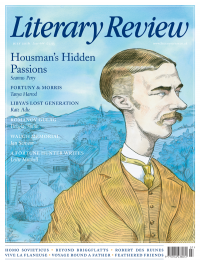Antony Spawforth
Beyond the Bosphorus
In the Land of a Thousand Gods: A History of Asia Minor in the Ancient World
By Christian Marek (Translated by Steven Rendall)
Princeton University Press 797pp £37.95
Modern Turkey roughly maps onto the nearly 300,000-square-mile land mass that the ancient Romans called ‘Asia Minor’. For today’s tourists, some of the main attractions of this spectacularly variegated subcontinent are the remains of antiquity with which it positively bristles. Nowadays visitors can step ashore from cruise ships to wander the marbled streets of ancient Ephesus, threatened by no more than touts for the restaurants and shops. It was not always thus. Pioneering archaeologists in what was then the Ottoman Empire ran grave risks from brigands, not to mention packs of furious sheepdogs. In the 1830s a whole team of German scholars was killed in the vicinity of Lake Van.
The Ottoman Turks infiltrated Byzantium from the east. Recent events have shown all too clearly the continuing function of what is now Turkey as a land bridge. In antiquity, armies marched through Asia Minor time and again, hellbent on reshaping the world. In 480 BC, the failure of Xerxes of Persia to add Greece to his empire allowed classical Greek civilisation to flower. In 334, Alexander of Macedon crossed the Bosphorus in the other direction, sweeping all before him as far as Pakistan. Posing as the liberator of the old Greek cities of Asia Minor’s west coast from Persia, he triggered a tremendous revival in their cultural vitality, even if the fanciful idea that Alexander aimed to bring Greek culture to a benighted Asia, which was promoted by Plutarch (in around AD 100) and by 19th-century scholars, has few advocates today.
On the other hand, ex oriente lux seems more meaningful than ever, as Christian Marek’s superb study demonstrates. DNA analysis shows that all today’s cattle in central Europe descend from forebears first domesticated in the Near East in the Neolithic Age (8000s BC). Migrating into Balkan Europe via Asia Minor,

Sign Up to our newsletter
Receive free articles, highlights from the archive, news, details of prizes, and much more.@Lit_Review
Follow Literary Review on Twitter
Twitter Feed
Russia’s recent efforts to destabilise the Baltic states have increased enthusiasm for the EU in these places. With Euroscepticism growing in countries like France and Germany, @owenmatth wonders whether Europe’s salvation will come from its periphery.
Owen Matthews - Sea of Troubles
Owen Matthews: Sea of Troubles - Baltic: The Future of Europe by Oliver Moody
literaryreview.co.uk
Many laptop workers will find Vincenzo Latronico’s PERFECTION sends shivers of uncomfortable recognition down their spine. I wrote about why for @Lit_Review
https://literaryreview.co.uk/hashtag-living
An insightful review by @DanielB89913888 of In Covid’s Wake (Macedo & Lee, @PrincetonUPress).
Paraphrasing: left-leaning authors critique the Covid response using right-wing arguments. A fascinating read.
via @Lit_Review